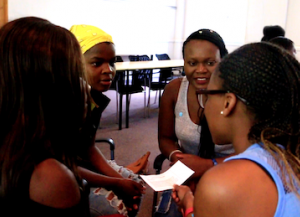
Background
Adolescent girls and young women (AGYW) in eastern and southern Africa bear a disproportionate burden of two co-occurring epidemics in the region: HIV and violence.
Globally, the association between intimate partner violence (IPV) and HIV is now well established and research shows multiple pathways by which partner violence increases young women’s HIV risk. One pathway involves the influence of violence – including the fear of violence – on women’s ability to take up and consistently use HIV prevention technologies such as pre-exposure prophylaxis (PrEP). Given mounting evidence, programmes that deliver these products to young women need to address this risk at the outset. We need innovative approaches to combination prevention in order to counter the negative impact of partner violence in shaping young women’s decisions to use PrEP.
Research
Building on in-depth work to understand the challenges that young women face, researchers developed a scalable health-sector intervention, incorporating several novel components within the context of adolescent and youth friendly services, and tested its feasibility, acceptance and safety.
The intervention included:
- provision of daily oral PrEP to HIV-negative AGYW within the context of a comprehensive sexual and reproductive health package;
- integrated screening and linkage-to-care for AGYW who had experienced lifetime gender-based violence;
- supportive interventions such as counselling.
The study compared this package of interventions with an enhanced support package, in which half the cohort was randomized to attend monthly empowerment clubs covering topics including: gender roles and social norms, power and control, sexual and reproductive health and empowerment.
The study involved 431 AGYW in Johannesburg, South Africa and Mwanza, Tanzania, and followed them for 6–15 months. Researchers also interviewed healthcare providers and community stakeholders.
Partners
- Wits RHI, University of the Witwatersrand, South Africa
- Mwanza Intervention Trials Unit (MITU), Tanzania
- London School of Hygiene and Tropical Medicine, UK
- International Centre for Research on Women (ICRW), USA
Resources
- Evidence brief: The EMPOWER study: An evaluation of a combination HIV prevention intervention including oral PrEP for adolescent girls and young women in South Africa and Tanzania
- Evidence brief: The EMPOWER study: an evaluation of a combination HIV intervention that includes oral PReP for adolescent girls and young women in South Africa and Tanzania (findings from Tanzania)
- Learning lab: Results from the EMPOWER randomised trial
- Learning lab: Integrating violence screening and support for young women accessing PrEP in South Africa and Tanzania: Experiences from the EMPOWER study
- Learning lab: The tale of two epidemics



